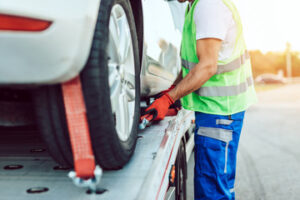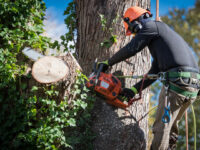Braking is a Key Ingredient in Towing
Getting your trailer safely down the road to your work or play destination requires more than just power. Braking is a key ingredient in the towing formula.
Overextending your towing capacity can damage your vehicle’s frame, suspension, braking, and transmission. Proper equipment use and maintenance can help prevent expensive repairs. Read on Phoenix Towing Near Me for more information.
As with any other driving activities, there are some safety considerations that must be taken into account when towing a trailer. These include knowing applicable laws and following best practices for towing. These considerations range from checking the towing vehicle’s capabilities to ensuring that lighting and indicating devices function properly. In addition, it is important to regularly check tire pressure and avoid sudden braking or acceleration as this can shift the load of the trailer.
Loading and unloading are also important stages for towing safety, and operators should be sure that they take the time to carefully fasten any items being transported. Using heavy duty straps, chains, or ropes can help to secure the loads securely in order to prevent them from shifting during transportation. It is also a good idea to keep a first aid kit on hand in case any accidents occur during transport.
Driving with a trailer requires drivers to slow down and maintain a safe distance from other vehicles on the road. This is because the additional weight of the trailer will cause the towing vehicle to have reduced braking capability and increased stopping distances. In general, it is a good idea to leave at least a 325-ft. gap between your vehicle and the vehicle in front of you. This will give you sufficient time to react in an emergency and avoid rear-end collisions.
Other important aspects of towing safety are ensuring that the towing vehicle is rated for the load and that all connections between the tow vehicle and trailer are tight and secure. Additionally, it is a good idea to have a safety chain on hand in the event that the primary means of attachment between the towing vehicle and the trailer fails. This is typically a heavy-duty chain with hooks or links that can be attached to both the towing vehicle and the trailer frames.
It is also a good idea to use an empty parking lot to practice driving with a trailer before attempting to do so on the road. This will allow drivers to get familiar with how the vehicle and trailer interact with one another and to learn any quirks or issues that may be unique to the combination.
Reliability
Whether you’re hauling a boat or an RV on the weekend, or you’re using your truck for work day in and out, knowing your towing capacity is vital. Not only do you need enough power to pull the trailer, but your vehicle’s suspension must be able to handle the extra stress and weight of the load. Additionally, your brakes need to be able to slow the trailer as well. If your current vehicle isn’t up to the task, it may be time for a tougher model.
Winter road conditions can be dangerous, and having a towing service that can respond quickly and efficiently is crucial. A recent story of a family stuck in a snowbank illustrates the need for reliable towing services in unexpected situations. In this case, a towing company was able to reach the family and safely pull them out of their vehicle. Snow can obstruct visibility, making it difficult to see other cars or traffic signals, and it can hide potholes and other hazards. In addition, wet or icy roads require more distance to stop safely. These factors can lead to unsafe driving conditions and increased stress on your vehicle’s parts and components. Knowing your towing capability and ensuring that your vehicle and trailer are properly equipped can help prevent unnecessary wear and tear on both vehicles.
Insurance
The towing business is a risky one. Vehicles don’t choose when they break down, and they often do so at the worst possible times. For this reason, it’s important for tow truck companies to have the right insurance policies in place. Insurance can protect them from liability issues, physical damage to their vehicles, and other risks specific to the industry.
Choosing the right commercial tow truck insurance is a big decision that involves many variables and should be done with care. Some of the main things an insurer will look at include your drivers’ ages, driving history, and experience behind the wheel; how much you typically tow or transport; and any previous claims or losses. The best way to get the most out of your policy is to work with an agent who specializes in this type of coverage.
A good towing insurance policy will include both on-hook and cargo coverage. The former covers damages to vehicles in your care that are on the road, while the latter covers the cost of labor to repair them. Depending on the policy, other options to consider may include rental expense and roadside assistance.
The right towing insurance will also take into account the three distinct areas of liability your business faces: those related to the vehicles you drive, the cargo you transport, and the property you garage. The peace of mind that comes with full protection is well worth the reasonable premiums you’ll pay for it.
For more information about tow truck insurance, reach out to us at CHOICE Insurance today. We can help you find the right policy for your unique needs, giving you peace of mind to focus on running your company with confidence. We have over 23 years of expertise in writing towing and transportation related risks, so we understand the ins and outs of this type of coverage. Contact us for a free quote today. Our friendly staff is always happy to assist you. We are dedicated to providing you with the best service and the highest quality of coverage at competitive rates.
Claims
A towing service must be aware of a number of different types of claims. These include wrongful acts that lead to injury and property damage, theft, vandalism, fire, and more. Insurance can help cover these costs and protect the business from loss of revenue. However, evaluating risk and the operational model is essential to tailoring this coverage.
Towing companies must also ensure that they have a good claims management solution in place. This is important for reducing claim handling times and ensuring that claims are handled properly. It also helps to reduce the amount of paperwork that is needed and streamlines the process. Wisentic, a towing claims management solution, provides a variety of customizable metrics and controls. These can be used to tailor the system to meet specific needs, including contractual checks.
In addition, a towing company must be sure that they have the right equipment to handle all of their towing operations. This can include heavy-duty towing trucks, and other specialized equipment for certain tasks. They should also ensure that their trucking fleet is insured in case of a collision or other accident. This type of insurance covers the cost of repairing or replacing the truck. It is crucial to have this type of coverage, especially for a business that depends on the vehicles in their fleet for income.
A tow contractor may not solicit owners for permission to tow to other lots or locations without the owner’s written consent. This is a violation of the license requirements of SS 283-15. A courtesy move is an exception to this rule and can be authorized by the supervisor after considering mitigating factors.
Unusual tows are tows that involve unusual circumstances requiring additional time or specialized equipment. They should be noted in the Tow Manager as such and the reason entered in the notes section. For example, if a large non-vehicle object was towed, this should be indicated in the tow manager as well.
Towing services should keep records of every vehicle that they transport or store. This includes a detailed description of the vehicle, as well as information such as its registration, location, and owner. These records must be kept available for inspection by a duly authorized representative of the City.






